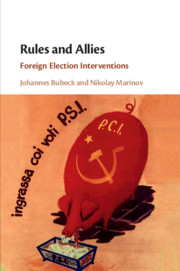Book contents
- Frontmatter
- Contents
- List of Figures
- List of Tables
- Acknowledgements
- 1 Introduction
- 2 Anarchy and Polyarchy
- 3 The Who and the How of Elections: A Theory with Interested Outsiders
- 4 Actors, Policies, Strategies: Original Data on Electoral Interventions
- 5 How Election Interventions Work: A Look at the Evidence
- 6 Captain America
- 7 When Money Runs Low and Regime Overthrow
- 8 Buying Allies
- 9 Conclusion
- Appendix
- References
- Subject Index
- Author Index
5 - How Election Interventions Work: A Look at the Evidence
Published online by Cambridge University Press: 15 July 2019
- Frontmatter
- Contents
- List of Figures
- List of Tables
- Acknowledgements
- 1 Introduction
- 2 Anarchy and Polyarchy
- 3 The Who and the How of Elections: A Theory with Interested Outsiders
- 4 Actors, Policies, Strategies: Original Data on Electoral Interventions
- 5 How Election Interventions Work: A Look at the Evidence
- 6 Captain America
- 7 When Money Runs Low and Regime Overthrow
- 8 Buying Allies
- 9 Conclusion
- Appendix
- References
- Subject Index
- Author Index
Summary
In this chapter, we rely on our novel dataset to test the theoretical insights. We also provide the first systematic, unvarnished look at the practice and statecraft of election intervention. Our data paints a dramatic picture. More than half of all elections in the world feature external interventions. In three-quarters of contests, the candidates running disagree on policy in ways that are consequential to at least one foreign power. In about half of those cases, one foreign power (or a camp of powers) prefers one candidate to win and another foreign power (or camp of powers) has the opposite preference.This partisan polarization sets the stage for external interventions in polyarchy. We show that efforts to promote candidates and attempts to change the rules of the game go hand in hand. Geopolitics conditions interest in an election but not in the way anticipated by the literature. When polarization is low, geopolitics does not matter. When polarization is such that the foreign power favors the opposition, geopolitics dictates greater investment in democracy. It is only when the foreigners like the government to win that the conventional prediction of geopolitics diminishing commitment to democracy obtains.
Keywords
- Type
- Chapter
- Information
- Rules and AlliesForeign Election Interventions, pp. 111 - 148Publisher: Cambridge University PressPrint publication year: 2019

